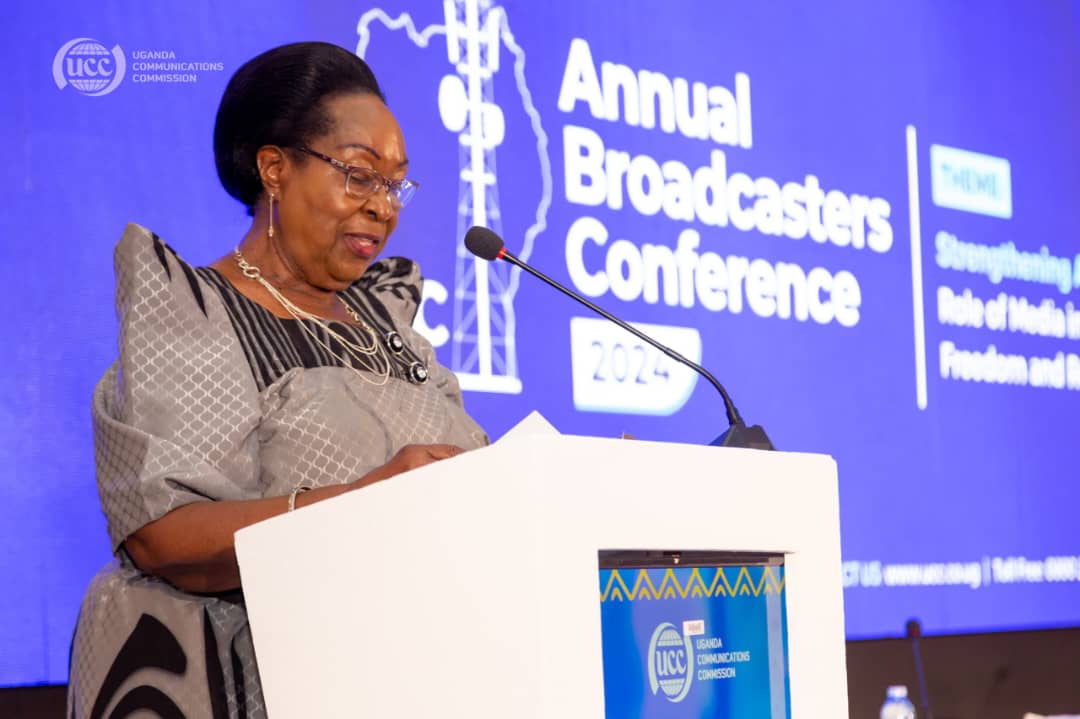The Ministry of ICT and National Guidance has officially unveiled guidelines for the allocation and utilization of one-hour weekly airtime dedicated to government public education on radio and television. The guidelines were released by Hon. Joyce Ssebugwawo, Minister of State for ICT and National Guidance, during the Annual Broadcasters’ Conference 2024, held on November 29 at the Imperial Royale Hotel, Kampala.
The conference, organized by the Uganda Communications Commission (UCC), brought together key stakeholders, including government leaders, broadcasters, media practitioners, and regulators, to discuss emerging trends and challenges in Uganda’s broadcasting sector. Hon. Ssebugwawo emphasized that the initiative is aimed at bridging communication gaps and ensuring that citizens are well-informed about government programs and services.
“This airtime provides an excellent opportunity for Ministries, Departments, and Agencies (MDAs) to communicate their work to the public in a structured, impactful, and transparent manner,” she said. The guidelines outline procedures for accessing and utilizing the airtime, ensuring accountability and maintaining a focus on public education.
The guidelines emphasize that the airtime must strictly be used to educate the public on government policies, programs, and services, with political content prohibited. The Ministry of ICT and National Guidance will oversee the allocation process and manage the implementation in the Kampala area, while Resident District Commissioners (RDCs) will manage implementation at the district level with support from District Communication Officers and Chief Administrative Officers.
Hon. Ssebugwawo stressed the importance of adhering to the guidelines to ensure the initiative meets its objectives. She also called for collaboration with broadcasters to maintain professionalism and ethical standards in content delivery. “Our goal is to ensure that citizens can access timely, accurate, and relevant information about government initiatives that impact their lives,” she noted.
The Minister of State for the Luwero Triangle, Hon. Alice Kaboyo, highlighted the essential role of the media in shaping Uganda’s socio-economic transformation. Kaboyo applauded media practitioners for their efforts in informing, educating, and inspiring the public. “The media is a critical partner in our journey toward socio-economic transformation,” said Kaboyo. She further emphasized the media’s responsibility to bridge the gap between government policies and the public while upholding high ethical standards in combating misinformation.
The Inspector General of Government, Ms. Beti Kamya, highlighted the importance of broadcasters in fostering accountability and transparency. She commended broadcasters for their role in shaping public opinion and encouraged continued collaboration with regulatory bodies to strengthen governance.
Ms. Julianne Mweheire, Director of Economic Regulation, Content & Consumer Affairs at UCC, highlighted UCC’s role in balancing media freedom with compliance to national regulations. She emphasized UCC’s commitment to building the capacity of broadcasters and fostering partnerships between the government and private sector.
Speakers at the conference reiterated the importance of professionalism, ethical broadcasting, and collaboration between the government and media practitioners. They emphasized the need to tackle challenges such as misinformation while leveraging opportunities in digital transformation to support Uganda’s development agenda.
The Annual Broadcasters’ Conference 2024, which focused on stakeholders from the Central Region, served as a platform for meaningful dialogue and underscored the role of media as a key driver of socio-economic transformation. With the release of the government airtime guidelines, the Ministry of ICT and National Guidance has reaffirmed its commitment to fostering transparency, accountability, and effective communication between the government and the public.


